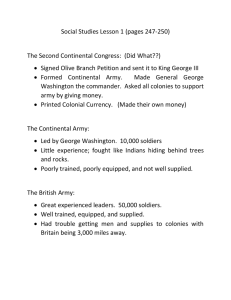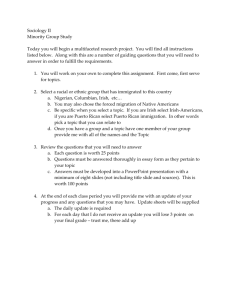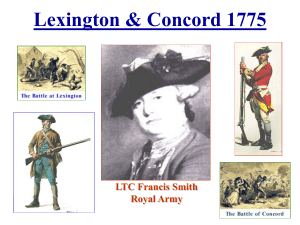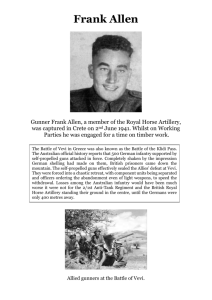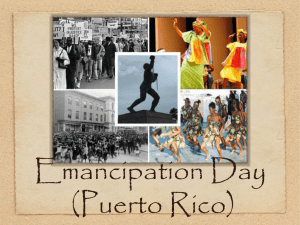Response to the Critics of the 65th Infantry Regiment
advertisement
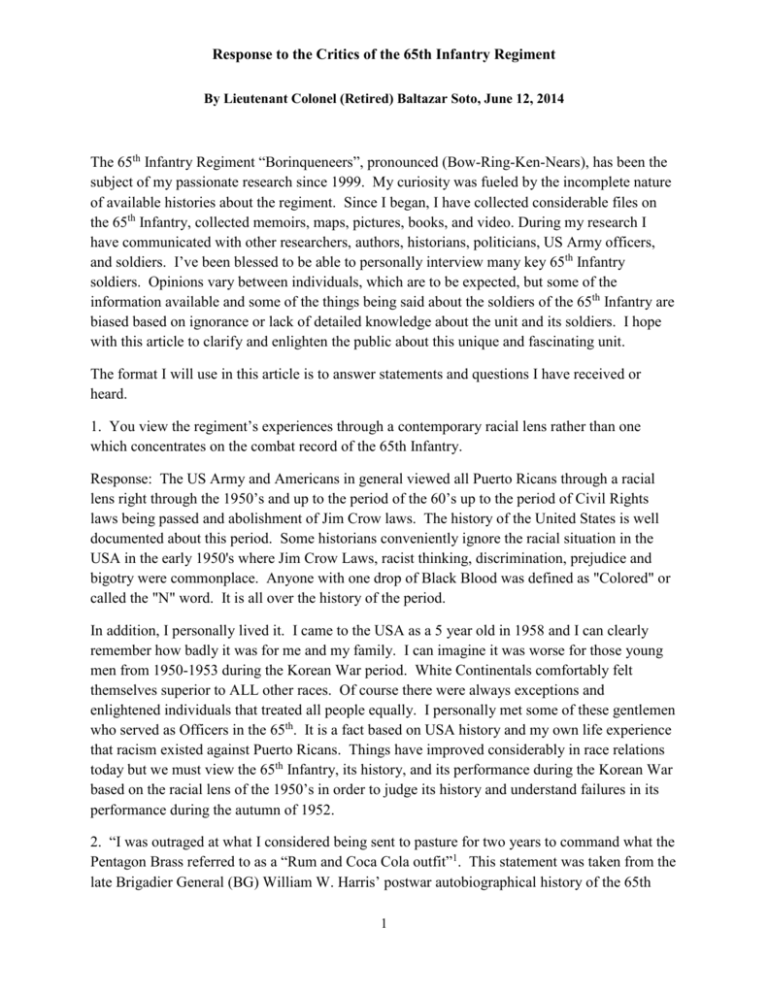
Response to the Critics of the 65th Infantry Regiment By Lieutenant Colonel (Retired) Baltazar Soto, June 12, 2014 The 65th Infantry Regiment “Borinqueneers”, pronounced (Bow-Ring-Ken-Nears), has been the subject of my passionate research since 1999. My curiosity was fueled by the incomplete nature of available histories about the regiment. Since I began, I have collected considerable files on the 65th Infantry, collected memoirs, maps, pictures, books, and video. During my research I have communicated with other researchers, authors, historians, politicians, US Army officers, and soldiers. I’ve been blessed to be able to personally interview many key 65th Infantry soldiers. Opinions vary between individuals, which are to be expected, but some of the information available and some of the things being said about the soldiers of the 65th Infantry are biased based on ignorance or lack of detailed knowledge about the unit and its soldiers. I hope with this article to clarify and enlighten the public about this unique and fascinating unit. The format I will use in this article is to answer statements and questions I have received or heard. 1. You view the regiment’s experiences through a contemporary racial lens rather than one which concentrates on the combat record of the 65th Infantry. Response: The US Army and Americans in general viewed all Puerto Ricans through a racial lens right through the 1950’s and up to the period of the 60’s up to the period of Civil Rights laws being passed and abolishment of Jim Crow laws. The history of the United States is well documented about this period. Some historians conveniently ignore the racial situation in the USA in the early 1950's where Jim Crow Laws, racist thinking, discrimination, prejudice and bigotry were commonplace. Anyone with one drop of Black Blood was defined as "Colored" or called the "N" word. It is all over the history of the period. In addition, I personally lived it. I came to the USA as a 5 year old in 1958 and I can clearly remember how badly it was for me and my family. I can imagine it was worse for those young men from 1950-1953 during the Korean War period. White Continentals comfortably felt themselves superior to ALL other races. Of course there were always exceptions and enlightened individuals that treated all people equally. I personally met some of these gentlemen who served as Officers in the 65th. It is a fact based on USA history and my own life experience that racism existed against Puerto Ricans. Things have improved considerably in race relations today but we must view the 65th Infantry, its history, and its performance during the Korean War based on the racial lens of the 1950’s in order to judge its history and understand failures in its performance during the autumn of 1952. 2. “I was outraged at what I considered being sent to pasture for two years to command what the Pentagon Brass referred to as a “Rum and Coca Cola outfit”1. This statement was taken from the late Brigadier General (BG) William W. Harris’ postwar autobiographical history of the 65th 1 Response to the Critics of the 65th Infantry Regiment Infantry in Korea titled “Puerto Rico’s Fighting 65th Infantry”2. The assertion of widespread illwill toward Puerto Rican soldiers within the U.S. Army officer corps is hearsay. Response: The statement is an accurate opinion of BG Harris, who had the honesty and courage to candidly state his own prejudice at the time of his assignment to the 65th Infantry. While the 65th Infantry had many fine officers assigned to it, during the three years the regiment was in Korea, it would have been assigned several hundred officers during that period, including five Regimental Commanders. It has been my experience that ALL units receive outstanding, average, and poor officers and the “bell curve” statistic represents it. Even the Officer Evaluation Report allows for this statistical fact. It is naïve to imply that ALL officers assigned to the 65th were outstanding or that BG Harris’s opinion is “hearsay”. I have interviewed other Continental Officers that have reinforced the fact that there was bad leadership in the 65th and there are other sources. One US Army document that I have obtained dared to put in writing what many Continental White Officers thought about Puerto Rican soldiers: “After getting the comments of many officers in the Caribbean Defense Command, LT Cols (Lieutenant Colonels) Anslow and Stoebe concluded that the Puerto Rican soldier was less efficient than the white continental; slightly less efficient than the American Indian because of smaller stature and physique; about equal to the Filipino Scout or Mexican; more efficient than the American Negro.”3 The late Colonel Walter Clark earned the Silver Star as a 1st Lieutenant assigned as an Infantry Platoon Leader in C Company, 65th Infantry in 1952. He frankly stated to me in an email dated 23 May 2000, “In those days, most continentals thought it was the kiss of death to be assigned to the 65th. I felt it was a challenge in leadership, but as a 21 year old Regular Army Second Lieutenant, I caught hell from some of the reservist serving as officers in the unit. As I look back, I know I would not, as a senior officer, have tolerated some of the poor leadership I saw at all levels in that unit.” On September 20, 2000 at the formal ceremony in Arlington National Cemetery to Commemorate the Korean War Veterans of the 65th Infantry Regiment, the Secretary of the Army, the Honorable Louis Caldera stated in his speech: “But even as the 65th struggled against deadly enemies in the field, they were fighting a rearguard action against a more insidious adversary – the cumulative effects of ill-conceived military policies, leadership shortcomings, and especially racial and organizational prejudices, all exacerbated by America’s unpreparedness for war and the growing pains of an Army forced by law and circumstances to carry out racial integration.” This was the first time that such a high official of the U.S. Army formally admitted that there was prejudice against Puerto Rican soldiers. 2 Response to the Critics of the 65th Infantry Regiment The famous military historian, Clay Blair frankly stated, “The Puerto Rican 65th Infantry Regiment, ridiculed in the Army as the “Rum and Coke” Regiment, was perceived as no more reliable than the 24th Infantry.”4 The 24th Infantry Regiment was a segregated Black unit and Mr. Blair’s statement shows that many officers in the Army were prejudice against Puerto Ricans as much as they were against Blacks. In November 1950 the 65th Infantry had been assigned to serve in X Corps, commanded by Major General Edward M. (Ned) Almond, who stated to BG Harris, then commanding the 65th Infantry Regiment that “he didn’t have much confidence in these colored troops. He said that he had a bitter experience with them in Italy and he didn’t trust them.”5 As stated above there are numerous sources for documenting and proving the racism against Puerto Ricans at the time and the thinking of Continental White Officers concerning Puerto Rican soldiers. It is not hearsay it is honesty! Any historian that believes that racism against Puerto Ricans is exaggerated is mistaken and in denial of historical fact. 3. The 65th is a controversial unit. The performance of the unit was uneven. The 65th Infantry Regiment is undeserving of a Congressional Gold Medal. Response: No doubt any segregated unit is “controversial” because whatever it does, or fails to do will be interpreted by many on a racial basis. The US Army had many segregated units during its history. The 65th Infantry was established by act of Congress in 1899 as a segregated unit consisting mainly of Puerto Rican soldiers with most of the officers being Continental White Americans. The unit was created by the US Government, it did not create itself. No unit stays the same over a period of time. Soldiers rotate out or become casualties. Officers rotate out. The unit changes its personnel through time. The 65th Infantry of 1952 was different from the Regiment of career Regular Army soldiers who deployed in 1950. When analyzed by its entire performance during the Korean War, the 65th Infantry was just as good, if not better than other infantry regiments of any of the UN countries or the USA. The statement that “performance of the 65th was uneven” is probably a reference to battles that the 65th lost, such as the battle of Jackson Heights in October 1952, after which over 90 Puerto Rican soldiers were court-martialed. At the same time we must realize that the performance of the entire US Army in Korea was “uneven”. The Army began the war losing battles in 1950 and being pushed into a corner of Korean around the town of Pusan. Eventually the US Army began winning battles and pushed back the enemy even going as far as the Chinese border in North Korea. Then the war drastically changed when the Chinese entered and pushed US Army units south in the greatest retreat in US Army history. New US Army leadership turned the situation around and General Ridgeway succeeded in putting a fighting spirit into our Army in Korea in 1951, stopping the Chinese offensive and pushing them back again. The performance of the entire U.S. Army in Korea was “uneven”. 3 Response to the Critics of the 65th Infantry Regiment “A military organization should be judged on its overall performance, not on isolated failures.” Colonel George L. MacGarrigle, Military Historian6 When it comes to claiming credit for the successes of the 65th we hear all about the Continental Officers. When it comes to taking blame for the few failures then we hear about the Puerto Rican soldiers. The Commander and his officers are responsible for the performance of a unit. How unusual that despite the majority of the officers being White Continental, not one Continental Officer was punished due to the combat failures of the 65th at Jackson Heights in 1952 and afterward. In fact the Continental Officers received medals and were promoted. Only Puerto Ricans were punished. The U.S. Congress has honored the service and sacrifice of the United States Army’s only Regular Army segregated Puerto Rican regiment. The Congressional Gold Medal finally recognizes thousands of forgotten Hispanic (mainly Puerto Rican) soldiers of the 65th Infantry and their service to the US Army and our nation. The opinions and conclusions reflected in this writing are those of the author and do not reflect the views of the Department of Defense, or any other governmental or non governmental agency. I assume total responsibility for the contents of this article and of the history it relates. William W. Harris, Puerto Rico’s Fighting 65th U.S. Infantry, (Presidio Press, San Rafael, CA, 1980), pg 1. 1 2 Ibid Edward H. Ross, The Puerto Rican Induction Program and the Use of Puerto Rican Troops, (Historical Division, Adjutant General’s Office, US Army Forces, Antilles, Fort Brooke, PR, 1948) 3 4 Clay Blair, The Forgotten War: America in Korea, 1950-1953 (Crown; 1st edition (December 12, 1987), pg 252. 5 Harris, Puerto Rico’s Fighting 65th U.S. Infantry. 6 Letter from COL George L. MacGarrigle to Noemi Figueroa, 22 June 1999, Author’s files. 4
